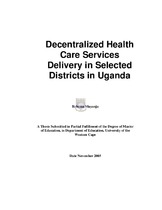Decentralized health care services delivery in selected districts in Uganda
Abstract
Decentralization of health services in Uganda, driven by the structural adjustment programme of the World Bank, was embraced by government as a means to change the health institutional structure and process delivery of health services in the country. Arising from the decentralization process, the transfer of power concerning functions from the top administrative hierachy in health service provision to lower levels, constitutes a major shift in management, philosophy, infrastructure development, communication as well as other functional roles by actors at various levels of health care. This study focused its investigation on ways and levels to which the process of decentralization of health service delivery has attained efficient and effective provision of health services. The study also examined the extent to which the shift of health service provision has influenced the role of local jurisdictions and communities. Challenges faced by local government leaders in planning and raising funds in response to decentralized health serdelivery were examined.

